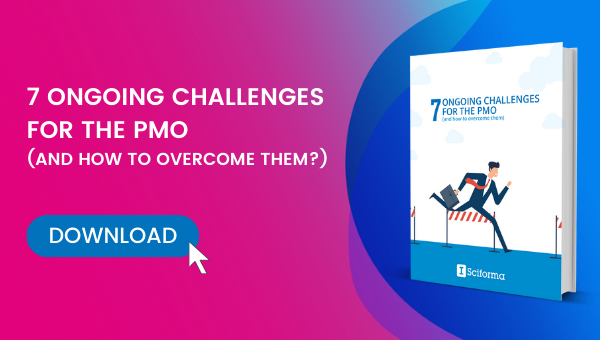The PMO (Project Management Office) is an organizational group or department designed to optimize the strategic output of project activity across a business. Traditionally, PMOs have been in charge with defining, enforcing, and maintaining project, program, and portfolio management standards to ensure organization-wide consistency and improve the efficiency of project work. However, as market conditions grew in complexity and as organizations grew in PPM maturity, Project Management Offices worldwide have evolved their role and place in the business towards a more central and strategic position.
The Role of the PMO in an Organization
Regardless of regions and industries, any organization doing business today is facing greater uncertainty and an accelerated pace of change. Globalization, digitalization, and consumer empowerment are some of the drivers that are compelling organizations and companies to execute in an increasingly complex world. In such a challenging environment, business success — survival, even — hinges upon the ability for the firm to reconcile long-term thinking and strategic planning with responsiveness to the frequent twists and turns of daily business requirements.
This is a significant challenge for senior executives, who need to ensure:
- Proper implementation of the strategic plans and programs defined at the C-suite level and designed to prepare the business for the future
- They have the necessary information to perform the adjustments and course corrections required to successfully carry out strategic initiatives
Enter: the PMO
A PMO will actively support the realization of key strategic programs, through process, method, and tool optimization, coaching and support to project populations, and overall oversight of project and portfolio life cycles. Additionally, the PMO helps executive leaders to make sure that their large strategic initiatives will deliver the expected impact by providing the data-based insights that’ll enable them to change gears rapidly whenever new conditions warrant a course correction.
Accordingly, a Project Management Office has become a key differentiator for any project-focused business.
The PMO’s Key Business Functions and Value
Although roles, responsibilities, and functions may vary significantly from one PMO to the next, a majority of Project Management Offices will fulfill the following key business functions:
Creating a conducive framework
A first key area of concern of the PMO is the definition and implementation of a consistent PPM framework to select and execute the projects in a way that’ll meet the company’s goals. Project Management Offices identify best practices that are optimized for the firm and ensure that appropriate standards for project management are maintained and followed. They also support the definition of a governance for project portfolio management, along with reporting and communication channels for project and portfolio updates, and escalation mechanisms. Finally, a PMO will provide support and training to project teams in order to ensure that effective project management practices are embedded in the organization
Deploying key capabilities
A Project Management Office is also tasked with making sure that project and portfolio managers can avail themselves of the skills, capabilities, and resources they need to perform effectively. This involves choosing the right PPM software — the one that best fits the business, that supports the company’s process, governance, and culture while offering a number of robust management capabilities. This also entails growing skilled employees through process and tool training, project manager coaching, new employee on-boarding, change management programs to ease the transition to new ways of working, and overall effort to introduce and maintain a project-management-friendly culture across the business.
Finally, the enabling role of the PMO involves seeing to it that the project, program, and portfolio managers have all the information they need to do their work optimally. This is often achieved through the development of a knowledge base consolidating helpful documentation, best practices, and lessons learned from past projects.
Actively contributing to efficient project portfolio management
A Project Management Office is much more than just an enabler or a facilitator. PMOs oversee project execution with a view to maintaining the quality of the deliverables. They take responsibility for the delivery of projects on behalf of the various business sponsors —through support to project managers in such areas as project selection, planning, and monitoring.
More importantly, a Project Management Office ensures that the projects that are selected, incorporated into portfolios, and executed have the best chances of producing the target organizational benefits. This implies in-depth understanding of the strategic drivers and directions of the business, as well as close relationships with the executive decision-makers who set the course of the company.
Business Benefits of a PMO
The benefits that an organization can derive from having a good Project Management Office deserve a dedicated article (which we wrote, as a matter of fact), and will vary from company to company. Here is however a brief overview of the key improvements that most organizations report after setting up a PMO:
- Better project metrics (on-time, on-budget, on-scope delivery rate)
- Better visibility into resource capacity, more efficient resource allocation and utilization, improved employee satisfaction
- Early identification of issues and conflicts and better risk management
- Improved synergy across teams and departments, better collaboration and communication organization-wide
- Better budget management and increased financial profit from project activity
- Increased alignment of PPM activities with the firm’s overarching strategic directions, and improved chances of realizing the strategic objectives.
The following blog posts may help you learn more about Project Management Offices:
- What Are The Different Types of Project Management Offices?
- What Is The Role of A Project Management Office?








Camélia Docquin
Camélia is Sciforma’s Marketing Manager for Europe and enjoys learning different perspectives of the current business environment and project management challenges that enterprises and individuals face daily. Main interests include : innovation, digital transformation, and strategy execution.